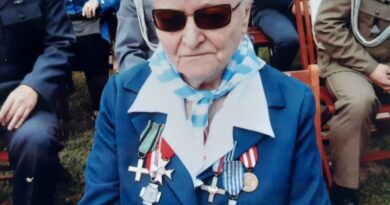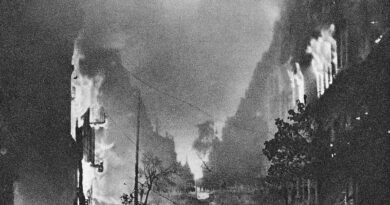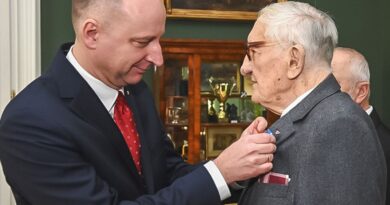Franco and East-Central Europe (Part 1)

Franco became an important ideological and military European ally in the struggle against Communist domination and influence. Therefore, despite stiff opposition of the USSR, its satellites, and much of the leftist and liberal public opinion in the West, the United States facilitated and, along with the Vatican, sponsored a gradual reintegration of Spain into the international community.
Marek Jan Chodakiewicz
In her pioneering work, Professor Matilde Eiroa of the European University in Madrid explores the foreign policy of Francisco Franco toward East Central Europe (henceforth referred to as ECE). Its conduct reflected Franco’s political pragmatism first of all. However, although the author downplays them, ideological affinities and personal preferences also played an important role in the Spanish ECE calculus. This interdependence of pragmatism and sympathy can best be demonstrated in the case of Poland and the Poles, many of whom were “radically anticommunist and profoundly Catholic”(154).
Soon after the eclectic coalition led by Franco won the Civil War in Spain, the Caudillo and his regime faced another serious crisis: The Second World War broke out on September 1, 1939. Franco leaned of course toward the foreign powers that had assisted his ascent to power: Germany and Italy. However, instead of jumping into the fray recklessly on the Axis side, he stayed a prudent course. Spain reeled from death and destruction wreaked by a decade of economic crisis and three years of merciless fratricide. Consequently, Madrid remained neutral throughout the Second World War. However, its neutrality had many shades. Naturally, the Spanish attitude toward the belligerents reflected their success, or its lack, on the battlefield.
Spain initially preserved strict neutrality. After the fall of France, however, Franco inched toward Hitler and Mussolini without embracing them openly. In 1942, the apparent imminence of Nazi victory over the Soviets prompted the Caudillo to become even more accommodating to the Axis demands for economic and diplomatic assistance. The Allied interests suffered accordingly. Franco even dispatched a division of Spanish anti-Communists to the eastern front to assist Hitler against Stalin. But even then the Spanish dictator allowed his underlings to assist Jews both in Spain and elsewhere in Europe. The assistance was selective and rather limited at first, concerning mainly the Sephardim and Ladino-speaking adherents to Judaism.
And then the fortunes of war reversed. Hitler’s armies were retreating. Franco withdrew the now decimated Division Azul from the Soviet front. Spanish rescue operations on behalf of Jews intensified. Madrid began increasingly to heed Allied requests for economic and diplomatic cooperation and to deny it to the Third Reich and her followers. Nonetheless, upon the Allied victory in Europe in May 1945, Nationalist Spain found itself in a very precarious predicament. The newly ascendant European Left, led by the Communists, sought to overthrow Franco and restore the coalition that had ruled the Spanish Republic. Ostracized on the international arena, Spain stressed its “anti-communism and Catholicism” (el anticommunismo y la catolicidad) to win favor with the United States as the world entered the Cold War. Of course the appeal of Catholicism was rather dubious, if any, among the Protestant (WASP) ruling elite of the USA. Nonetheless, the advantages of a friendly anti-Communist Spain were soon noted and Washington began looking favorably upon Madrid. Franco became an important ideological and military European ally in the struggle against Communist domination and influence. Therefore, despite stiff opposition of the USSR, its satellites, and much of the leftist and liberal public opinion in the West, the United States facilitated and, along with the Vatican, sponsored a gradual reintegration of Spain into the international community.
While stressing its “undemocratic characteristics,” Matilde Eiroa points out correctly that “the sole purpose” of Spanish foreign policy was “to maintain General Franco in power” (p. 7). True enough, the decision making process was quite undemocratic. But what does that tell us about Franco’s foreign policy in general and in ECE in particular? Was that bad for, say, Poles and Jews? After all, the attitudes of Nationalist Spain toward those groups during the Second World War compare favorably, to say the least, with the foreign policy endeavors on their behalf of liberal democratic Sweden and Switzerland. Thus, without confusing the means with the ends, and classifying foreign policy by its modus operandi and outcomes, we can identify Franco’s foreign policy as primarily driven by pragmatism just as that of almost any other contemporary leader. This simple observation facilitates our understanding of Spain’s approach to ECE much better than a less relevant factor of “undemocratic characteristics” of Madrid’s foreign policy. One wishes this factor received more consideration and space.
Nonetheless, Professor Eiroa occasionally admits the importance of pragmatism, or as she puts it, “realpolitik” [sic], in Spanish foreign policy thinking. For instance, following the war, Franco recognized ECE governments-in-exile only because the Communist puppet regimes installed in Warsaw, “Budapest, Sofia, Belgrade, Bucharest, [and] Prague” invited Spanish Republican diplomats to establish embassies in their countries (p. 162). Likewise, the post-1945 attempts to recoup Spanish assets in ECE fall in the same category of pragmatism. After all, a pure ideologue of anti-Communism would have had nothing to do with Stalin’s proxies in ECE. At times the justifications of Spanish pragmatism bordered on convoluted. For example, to appease the Nazis and to show support for an avowedly Catholic, yet radical nationalist regime of the Croatian Ustasha, Madrid recognized Zagreb, invoking disingenuously as precedent the arrival in 1422 of the envoys of the Kingdom of Aragon in the Republic of Ragusa, “Croat and free” (croata y libre) (p. 49 n. 31).
(…)
We would like to thank prof. Marek Jan Chodakiewicz for sharing this article.



